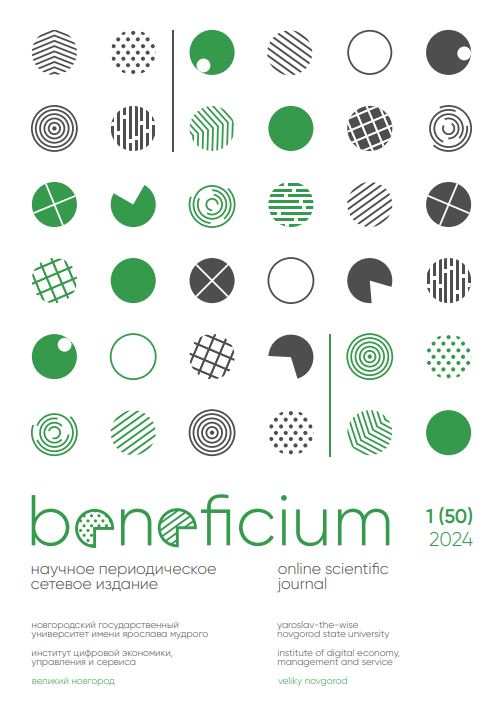INCOMES AND HOUSING CONDITIONS OF THE POPULATION AS FACTORS INFLUENCING DEMOGRAPHICS IN THE REGIONS
Abstract
The issues of choosing indicators of well-being, level, and quality of life of the population in the scientific community often cause well-founded discussions. The authors of the presented work believe that one of the most significant indicators, considering the availability of information and a fairly broad interpretation, is life expectancy in the territory. This is since this category reflects the general level of development of the region under study, i.e. describes the health, social, environmental, demographic, political and other spheres now, and considers the prospects of functioning. This indicator is also important for the economy, since it is considered in long-term development programs, directly affects the labor market and the activities of social services. In this regard, the basic indicator in this work is life expectancy. The subjects of the Central Federal District (CFD) are the object of monitoring. In the presented article, based on the identified dependencies for the period from 2000 to 2021, the relationship between life expectancy and infrastructural factors is substantiated using the example of the regions of the Central Federal District. The latter have found expression in the real incomes of the population and the number of families in need of a change of housing. From the authors' point of view, the situation is aggravated by insufficient rates of housing renovation and insignificant income growth. The studied and identified relationships and dependencies can be applied within the framework of national and regional development, as well as draw the attention of representatives of territorial administrations to the level of satisfaction with housing stock, and the population to issues related to financial capital management.
Keywords: analysis, housing conditions, correlation, life expectancy, region, regression, families with children
References
Pautov I.S. Sociological Analysis of the Connections between Welfare Dynamics and Health Indicators on the Macro-Level in the Modern Russia // St. Petersburg Sociology Today. 2015. Vol. 6. Pp. 408-422. (In Russ.).
Nacher M., Basurko C., Manuella Imounga L., Wang Q., Van Melle A., Lucarelli A., Adenis A., Drak Alsibai K., Hcini N., Sabbah N. Complex Sex Differences in Life Expectancy in French Guiana // International Journal of Environmental Research and Public Health. Vol. 20(13). Pp. 1-14. DOI: 10.3390/ijerph20136195
Prokhorov B.B., Gorshkova I.V., Tarasova E.V. Dependence of Life Expectancy of the Russian Population on External Factors // Forecasting problems. 2004. Vol. 6. Pp. 114-125. (In Russ.).
Akbar J.H., Yusriyadi Y., Priyatna S. Legal Politics of Public Housing Savings for Citizens’ Decent and Affordable Housing // Corporate Law & Governance Review. 2024. Vol. 6(1). Pp. 19-26. DOI: 10.22495/clgrv6i1p2
Panchenko A.A. Influence of Housing Policy on Social and Demographic Safety of the Country // Scientific Journal of KubSAU. 2016. Vol. 121(07). Pp. 1721-1731. (In Russ.). DOI: 10.21515/1990-4665-121-106
Maksimova I.V., Skachkova I.I. Saving Behaviour of the Population of Russia: a Synthesis of Keynesian and Neoclassical Theories // Research Result. Economic Research. 2023. Vol. 9(1). Pp. 119-129. (In Russ.). DOI: 10.18413/2409-1634-2023-9-1-0-10
Shneiderman I.M., Grishanov V.I., Guzanova A.K., Nozdrina N.N. The Problems of Dilapidated and Emergency Housing in Russia // Population. 2019. Vol. 22(4). Pp. 18-35. (In Russ.). DOI: 10.24411/1561-7785-2019-00036
Kantz M.E., Enah C., Abdallah L.M. The Relationship Between Health and Housing in Low-income Older Adults: A Secondary Analysis of Survey Data // Public Health Nursing. 2023. Vol. 40(6). 931-939. DOI: 10.1111/phn.13248
Gimpelson V.E. Age and Wage: Stylized Facts and Russian Evidence // HSE Economic Journal. 2019. Vol. 23(2). Pp. 185-237. (In Russ.). DOI: 10.17323/1813-8691-2019-23-2-185-237.
Zakaria S., Roslan U.A.M., Alias A., Malik S.M.A., Fatimah N. Mathematical Model on Relationship Between Expenditure in Education and Household Income Group in Malaysia // AIP Conference Proceedings 2355(1). 2021. DOI: 10.1063/5.0053371
Ozhamaratli F., Kitov O., Barucca P. A generative model for age and income distribution // // EPJ Data Science. 2022. Vol. 11(1). 1-4. DOI: 10.1140/epjds/s13688-022-00317-x
Eliseeva I.I., Bochenina M.V. Demand in the Housing Market and the Needs of Russian People: an Econometric Approach // Economic revival of Russia. 2022. Vol. 4(74). Pp. 41-56. (In Russ.). DOI: 10.37930/1990-9780-2022-4-74-41-56.
Grishina E.E., Tsatsura E.A. The Influence of Payment of Benefits at the Birth of the 1st and 2nd Child on the Level of Family Poverty // Discussion. 2019. Vol. 2(93). Pp. 52-62. (In Russ.). DOI: 10.24411/2077-7639-2019-10006
Borodina T.V., Gugnina E.V. Analysis of the Structure and Dynamics of Income of the Russian Population // Bulletin of the Altai Academy of Economics and Law. 2020. Vol. 12(3). Pp. 478-485. (In Russ.). DOI: 10.17513/vaael.1536
Geniberg T.V. Trends in Income, Expenses and Savings of the Population of the Russian Federation in 2022 // The Review of Economy, the Law and Sociology. 2022. Vol. 4. Pp. 29-34. (In Russ.).
Egorov E.Yu. Analiz tekushchego urovnya finansovoj gramotnosti naseleniya Rossii: vyzovy i perspektivy [Analyzing the Current Level of Financial Literacy of the Russian Population: Challenges and Prospects] // Economic Sciences. 2023. Vol. 6(223). Pp. 465-470. (In Russ.). DOI: 10.14451/1.223.465
Regions of Russia. Socio-economic indicators (2023). Federal State Statistics Service. (In Russ.). URL: https://rosstat.gov.ru/folder/210/document/13204(accessed on 10.01.2024).
About the Authors
Denis Y. Fraymovich – Dr. Sci. (Economics), Docent; Professor, Vladimir State University named after Alexander and Nikolay Stoletovs, Vladimir, Russia. E-mail: fdu78@rambler.ru. SPIN РИНЦ 8083-9121. ORCID 0000-0001-9702-9093
Olesya S. Vakulenko – Student, Vladimir State University named after Alexander and Nikolay Stoletovs, Vladimir, Russia. E-mail: vakulenko.olesya2016@yandex.ru. SPIN РИНЦ 8664-0956. ORCID 0009-0004-4942-6640
Ksenia A. Vlasenko – Senior Lecturer, Vladimir State University named after Alexander and Nikolay Stoletovs, Vladimir, Russia. E-mail: vla.ksenia@mail.ru. SPIN РИНЦ 8958-3915. ORCID 0000-0002-3207-2653. ResearcherID ADK-0292-2022
For citation: Fraimovich D.Y., Vakulenko O.S., Vlasenko K.A. Incomes and Housing Conditions of the Population as Factors Influencing Demographics in the Regions // Beneficium. 2024. Vol. 1(50). Pp. 109-116. (In Russ.). DOI: 10.34680/BENEFICIUM.2024.1(50).109-116









